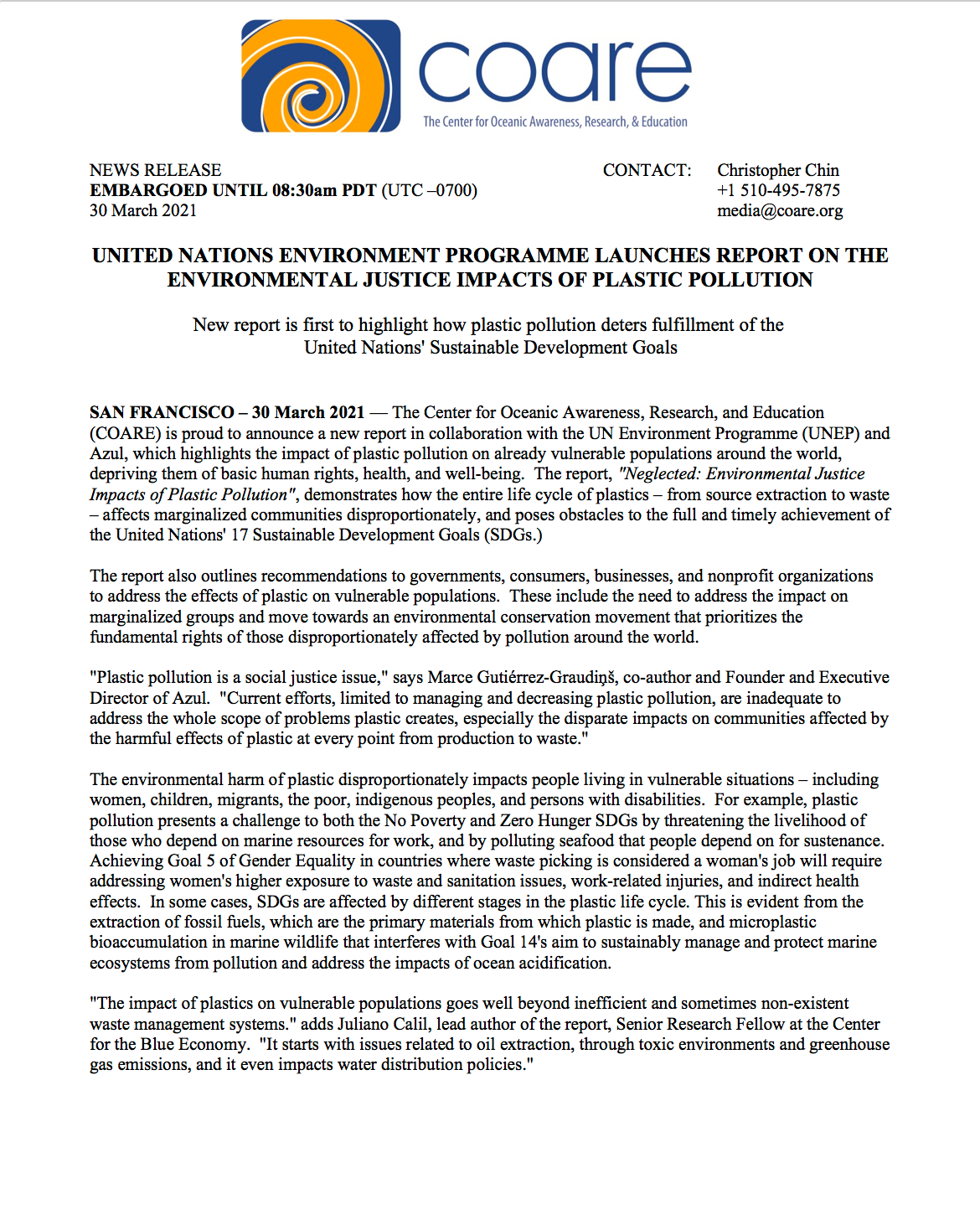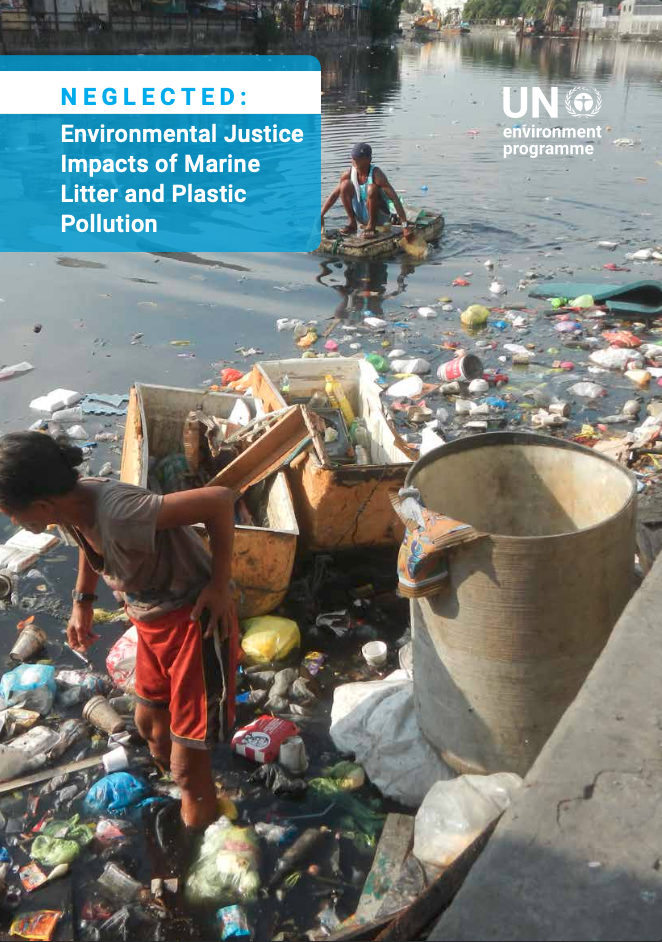Enough with the Plastic Already!:
Environmental Justice
Impacts of Plastic
United Nations Environment Programme Launches Report on the
Environmental Justice Impacts of Plastic Pollution
SAN FRANCISCO – 30 March 2021 — The Center for Oceanic Awareness, Research, and Education (COARE) is proud to announce a new report in collaboration with the UN Environment Programme (UNEP) and Azul, which highlights the impact of plastic pollution on already vulnerable populations around the world, depriving them of basic human rights, health, and well-being. The report, "Neglected: Environmental Justice Impacts of Plastic Pollution", demonstrates how the entire life cycle of plastics – from source extraction to waste – affects marginalized communities disproportionately, and poses obstacles to the full and timely achievement of the United Nations' 17 Sustainable Development Goals (SDGs.)
The report also outlines recommendations to governments, consumers, businesses, and nonprofit organizations to address the effects of plastic on vulnerable populations. These include the need to address the impact on marginalized groups and move towards an environmental conservation movement that prioritizes the fundamental rights of those disproportionately affected by pollution around the world.
"Plastic pollution is a social justice issue," says Marce Gutiérrez-Graudiņš, co-author and Founder and Executive Director of Azul. "Current efforts, limited to managing and decreasing plastic pollution, are inadequate to address the whole scope of problems plastic creates, especially the disparate impacts on communities affected by the harmful effects of plastic at every point from production to waste."
The environmental harm of plastic disproportionately impacts people living in vulnerable situations – including women, children, migrants, the poor, indigenous peoples, and persons with disabilities. For example, plastic pollution presents a challenge to both the No Poverty and Zero Hunger SDGs by threatening the livelihood of those who depend on marine resources for work, and by polluting seafood that people depend on for sustenance. Achieving Goal 5 of Gender Equality in countries where waste picking is considered a woman's job will require addressing women's higher exposure to waste and sanitation issues, work-related injuries, and indirect health effects. In some cases, SDGs are affected by different stages in the plastic life cycle. This is evident from the extraction of fossil fuels, which are the primary materials from which plastic is made, and microplastic bioaccumulation in marine wildlife that interferes with Goal 14's aim to sustainably manage and protect marine ecosystems from pollution and address the impacts of ocean acidification.
"The impact of plastics on vulnerable populations goes well beyond inefficient and sometimes non-existent waste management systems." adds Juliano Calil, lead author of the report, Senior Research Fellow at the Center for the Blue Economy. "It starts with issues related to oil extraction, through toxic environments and greenhouse gas emissions, and it even impacts water distribution policies."
Historically, after use, almost 80% of plastic products end up accumulated in landfills or the environment, and 12% are incinerated, increasing greenhouse gas emissions and releasing toxic pollutants. Huge amounts of plastic pollution end up in rivers, waterways and oceans, aggregating pollutants, harming wildlife and impacting communities that depend on the ocean for their sustenance and livelihood. "It is evident that we have much to learn about the full impacts of plastics on human health and the environment," said Steffanie Munguía, PhD student at Florida International University and one of the report's authors. "But it's imperative that we act swiftly to address those impacts we do understand. Those include significant market and regulatory challenges to curbing our dependence on plastics and protecting the lives and livelihoods of those who are most exposed to their impact."
The report details cases of environmental injustice from deforestation and displacement of Indigenous People to extract oil, through the contamination of potable water by fracking fluids and waste water from Pennsylvania to Sudan. "Each step in the life cycle of plastic is harmful not just to the environment, but also to human health, and the damage disproportionately affects vulnerable communities," adds Christopher Chin, co-author and Executive Director of The Center for Oceanic Awareness, Research, and Education (COARE). "The more we uncover these hazards, the more clear the picture of abuse – and the need for globally coordinated solutions – becomes."
The report is available for download from the UNEP Document Repository: https://wedocs.unep.org/
About COARE The Center for Oceanic Awareness, Research, and Education, Inc. (COARE) is a tax-exempt nonprofit organization based in the San Francisco Bay Area. Its purpose is to study our oceans and increase public awareness of the earth's marine environment through educational programs and outreach. COARE seeks to enlighten people, young and old, to the plight of the oceans, to change the way they think and act, and to encourage them to create positive and lasting change. For more information about COARE, visit https://www.coare.org.
About Azul Azul is an environmental justice organization working with grassroots communities to protect coasts and the ocean. Founded in 2011, Azul has developed –and executed– campaigns that achieved groundbreaking ocean conservation policy victories.
About the UN Environment Programme (UNEP) UNEP is the leading global voice on the environment. It provides leadership and encourages partnership in caring for the environment by inspiring, informing and enabling nations and peoples to improve their quality of life without compromising that of future generations.
Click here to download a copy of the Press Release (143Kb PDF).

Click here to download a copy of the UNEP Report (5Mb PDF).

What you can do to help
- Remember the adage, "Think Globally; Act Locally";
- Oppose the expansion and proliferation of Petrochemical plants, especially those in vulnerable communities;
- Demand that government officials take an active and supportive approach towards equity and international cooperation;
- Contact your lawmakers and let them know how important this issue is, and that you would like them support efforts to hold industry accountable;
- Consider your own impact, and always seek and demand reusable options;
- Support "bag-ban", straw-reduction bills, and extended producer responsibility efforts in your state or city;
- Download a copy of the "Neglected" report and share this information.



